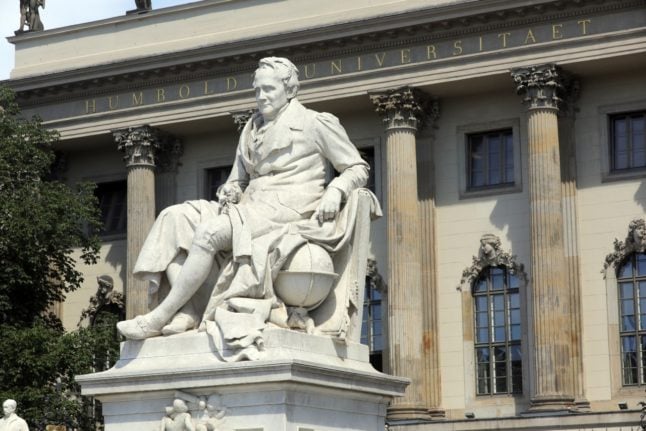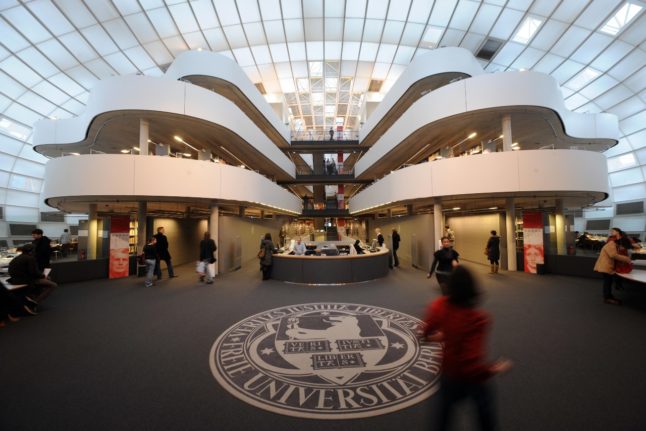From the economic theories of Karl Marx to the philosophy of Emmanuel Kant, Germany has produced some great writers and thinkers over the centuries, and as you might expect, many of its academic institutions live up to this prestige.
According to the latest stats, there are 380 universities in Germany offering more than 17,000 study programmes. In most cases, studying for a degree at one of these universities is absolutely free – regardless of whether you’re a German or international student – and enrolling on a course often comes with perks such as a semester ticket offering heavily subsidised travel.
READ ALSO: 10 reasons to study in Germany
But while studying in Germany can be an enriching and exciting experience wherever you are, there are some German universities that stand out above the rest.
According to the THE University Rankings, which scores academic institutions based on a range of criteria, these are the top 10 universities in the country in 2023.
1. Technical University, Munich
As one of the most prestigious universities in the country, Munich’s Technical University needs very little introduction, but suffice it to say the institution has been ushering some of the most talented scientific minds through its doors since 1868.
Though the famous German author Thomas Mann can be counted among its renowned alumni, this isn’t the place for literature and humanities buffs: instead, the TU is a centre of excellence for subjects like computer science, chemical engineering and mathematics.
With TU Munich taking the top spot in Germany and also ranking among the top 10 universities in Europe, students here can expect excellent teaching and rigorous academic standards. But getting in here is no easy feat, with just eight percent of applicants getting accepted – so keep those good grades up if you want to be in with a shot!
READ ALSO: Two universities in Munich named best in Germany
2. Ludwig Maximilian University (LMU), Munich
Coming hot on the heels of Munich’s Technical University is the Bavarian capital’s second, much older university: Ludwig Maximilian University, or LMU for short.
Originally founded in Ingolstadt way back in 1472, the medieval institution relocated to nearby Landshut in 1800 before re-establishing itself in Munich in 1826, where it remains to this day. Its name honours its original founder Herzog Ludwig IX, as well as the Bavarian king who brought the university to Landshut: Maximilian I. Joseph.

The campus is spread out across the city, though the main building with its grandiose light-filled domes and many other departments are located right next to the English Garden in Maxvorstadt.
Unlike the Technical University, LMU offers a full range of subjects, from music to meteorology – as well as an ever expanding list of BA and MA programmes in English. In the last century, at least 15 Nobel Prize-winners have studied or taught at LMU, so students here will be in good company.
3. Heidelberg University, Heidelberg
For Mark Twain, who lived in Heidelberg in the summer of 1878, the city was “the last possibility of the beautiful”. Heidelberg’s ornate medieval university, which is situated in the heart of the impeccably preserved Altstadt, no doubt played a part in making such an impression on the American writer.

Though Germany’s universities don’t quite have the elitist reputation of their US or UK counterparts, you could well think of Heidelberg as the Oxford or Cambridge of Germany. Founded in 1386, it is not only one of Europe’s oldest universities, but also maintains a reputation for excellence in subjects such as natural sciences, art history, medicine and law to this day.
Taking a stroll along the Philosopher’s Walk, which winds up into the verdant hills past the glistening Neckar, you’ll be treading in the footsteps of some of the famous thinkers who studied or taught at Heidelberg over the years, from Max Weber to Hannah Arendt. You’ll need top-notch grades to study here, but once you’re accepted into this prestigious university, you won’t regret a second of your hard work.
4. Charité Medical University, Berlin
Affiliated with Berlin’s two major universities – Humboldt and Free University – is Charité, a highly respected training college for medical professionals with links to the city’s Charité hospital.
In the latest THE rankings, Charité was ranked the fourth best university in the country, and with its reputation for cutting-edge, patient-centered medical training and research, it’s no wonder.
As a highly popular institution in the heart of bustling Berlin, there’s a fair bit of competition to get into Charité, but with an ever-expanding number of English-language courses such as medical neuroscience, midwifery and epidemiology, applications from international students are very much welcomed.
5. Humboldt University, Berlin
Named after the famous linguist and educationalist Wilhelm von Humboldt and his brother, the explorer and natural scientist Alexander von Humboldt, Berlin’s largest and oldest university has a reputation for excellence, especially in the sciences.
When it was founded back in 1809 on the initiative of Wilhelm von Humboldt, the university bore the name of the then-King Friedrich Wilhelm III. In 1949, however, it was renamed to honour the Humboldt brothers, giving rise to its iconic crest bearing their silhouettes. In the GDR years, it was the largest university in the whole of East Germany.

One thing that has remained the same, however, is the imposing main campus building along Unter den Linden, which was fully reconstructed after the war. Rising up like a magnificent Prussian palace, the grand entrance hall continues to inspire awe in students to this day – just as it may have inspired the some 52 Nobel prize-winners affiliated with this renowned university over the years.
6. Eberhard Karls University, Tübingen
Down in the picturesque university town of Tübingen in Baden-Württemberg is the Eberhard Karls University, a small and historic institution that regularly punches above its weight in the rankings.
In the QS World University Rankings, for example, EK University recently landed in sixth place for theology and religious studies, and the institution has also been ranked in the top 50 worldwide for archeology, anthropology and the humanities more generally.
READ ALSO: How do I get a student visa for Germany and what does it let me do?
Students living in Tübingen also have the benefit of living in a charming town that has all the amenities students could need, while offering easy access to Baden-Württemberg’s idyllic countryside and the bustling city of Stuttgart.
READ ALSO: What foreign students should know about applying for German citizenship
7. University of Bonn, Bonn
The university in the former capital of West Germany is regularly numbered among the top 10 academic institutions in the country, and its stunning campus just a stone’s throw from the Rhine makes it a truly romantic place to study.
Bonn’s alumni list reads much like a who’s-who of German grandees, from the philosopher Friedrich Nietzsche to poet Heinrich Heine and the great post-war statesman Konrad Adenauer. These days, this renowned institution welcomes high-achievers from across the world with almost 90 English-language BA and MA programmes, as well as programmes taught in French, Italian and Spanish.
8. Free University, Berlin
Based out in leafy Dahlem in the former West German part of the city, Berlin’s Free University played a strong role in the rebuilding of a liberal and democratic Germany in the aftermath of the Second World War. It was founded in 1948 with the support of local politicians and the American allied forces and still has strong links to the US to this day, including its world-leading John F Kennedy Institute, which is dedicated to American Studies.
In contrast to Humboldt University, Free University is known primarily in the area of languages and humanities, with philology and cultural studies ranking among its research specialities. A highlight of studying here is access to the Philological Library – nicknamed ‘The Brain’ – a feat of architecture designed by Norman Foster to replicate the human mind.
READ ALSO: Essential German words to know as a student in Germany

9. RWTH Aachen University, Aachen
Based in the beautiful cathedral city of Aachen close to the Belgian and Dutch borders, the Rhineland Westphalian Technical University is one of the most well-respected technical universities in Europe.
The vast majority of students here – around 80 percent – study either mathematics- or engineering-related subjects, while a smaller number take courses in medicine and the social sciences.
As well as counting among the top 10 universities in the country, RWTH Aachen is almost among the top 100 universities worthwhile, according to THE. So if you can get the grades to study here, it’s a name that’s bound to look good on your Lebenslauf, or CV.
10. Albert Ludwig’s University, Freiburg
Situated in Freiburg’s breathtaking Altstadt, just a stone’s throw from the cathedral, is the medieval Albert Ludwigs university – another of Germany’s elite academic institutions.
Though the university was actually founded way back in 1457, don’t expect to spend your time in crumbling old buildings. Freiburg’s campus is astoundingly modern and chic and is capped off by the jaw-dropping University Library, a geometric wonder formed out of glass.

Much like the quaint town of Freiburg itself, the Albert Ludwig University has a reputation for sustainability, but it also regularly earns accolades for its research clout. In fact, the university recently come third in Europe for the number of research citations its academics received.
Much like many of Germany’s top technical universities, AL Freiburg is also known for producing prominent scientists and ranks highly in terms of alumni careers, so earning a degree here is certainly time well spent.




 Please whitelist us to continue reading.
Please whitelist us to continue reading.
Member comments